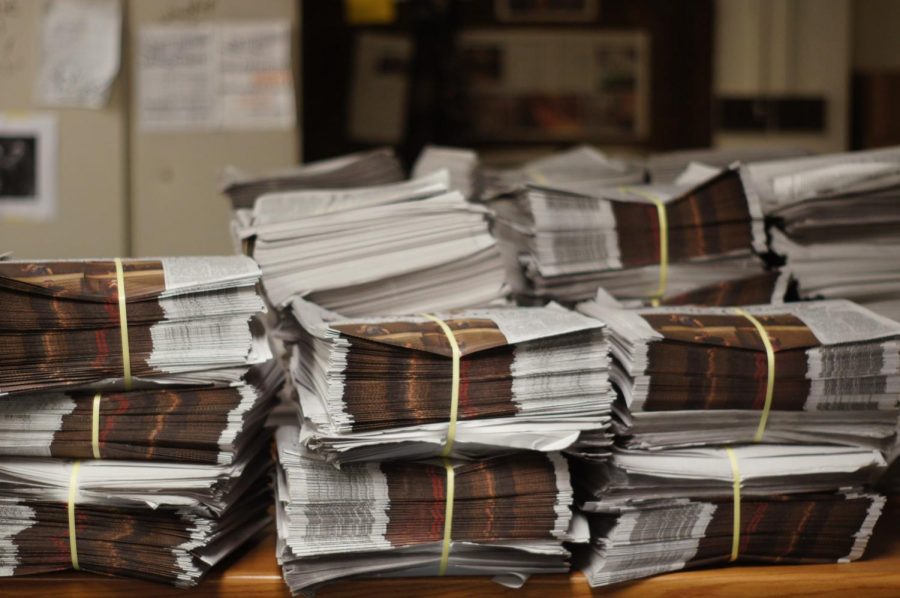When I attended the first Op/Ed meeting for the Massachusetts Daily Collegian, my main feeling was one of rapt anticipation. I’ve always wanted my writing to be read by a wider audience, and the Collegian was the perfect platform to achieve my goal. There was, however, one detail that I heard in the meeting that greatly disappointed me. To my dismay, I learned that the Collegian had ceased printing physical editions around the beginning of the pandemic. Mind you, this wasn’t a spur-of-the-moment decision by the paper’s administrators; rather, the printing press historically used by the Collegian had become unavailable to the paper.
The timing, whether you’d consider it fortuitous or just another tragic event in the hectic early months of 2020, just happened to coincide with the start of COVID-19 restrictions. In any case, I was disappointed to hear that I’d arrived after the end of an era.
Whether it’s a book, magazine or newspaper, I’ve always found the physical form of a text to be infinitely preferable to the impermanence of digital copies. The tactile sensation of paper in my hands provides a feeling that cannot be achieved by looking at a screen, even if that screen is designed to provide the illusion of authenticity like “e-ink” readers. Although these may seem like the musings of an old grouch, most of the people I’ve spoken to have agreed that there’s something special about print.
I lament the slow death of print journalism, even if it is inevitable. The Collegian’s halt in print publication was not an anomaly. The local and small-scale print journalism industries, as it’s well known by now, have been atrophying for years, leading to what will be both a death by natural causes and a murder. E-readers and easy online access spelled doom for traditional media business models by out-competing the accessibility and cost of the local paper. National outlets, however, have also played a part in actively destroying local papers through homogenization and shameless profit-mongering. Small papers, if they survive, are ransacked by private equity, leaving them with far fewer resources to fulfill their vital role as watchdogs of local politics and society.
Outlets on the internet that try to fill the local niche cannot fully do so. There is something important about the physical form of a paper that ties it to a place that’s not able to be substituted by a website. The internet is fundamentally about connection across boundaries, which is by and large a great achievement. But it’s not rooted in geography. Sure, forums like Nextdoor or city subreddits can serve as a water cooler for smaller geographic groups, but they’re the exceptions to the rule. In some sense, tactility is inimitably intertwined with the function of local newspapers.
Unfortunately, the collapse of print journalism is just one manifestation of a broader collapse of community bonds. Robert Putnam published his book “Bowling Alone” two decades ago, which explored the decline of social clubs, community involvement and general “social capital” in America. Since then, these trends have not abated and are nicely complimented by other trends like the fraying of partisan relations. Once-reliable community institutions like newspapers are dying along with the benefits that they brought to communities far and wide. These communities need not be envisioned as just pastoral white picket fence suburbia; alt-weeklies promoted nontraditional groups, and some papers were created by and for minority ethnic and religious groups.
While the Collegian isn’t exactly having its sinews sliced up by a private equity firm, the end of its physical edition is still a tragedy. A physical, circulating newspaper is a powerful force to unify a community, whether it’s through lighthearted opinion pieces or hard-hitting investigative reporting. I think that the pleasures of a physical copy are easy to appreciate once it’s in your hands. It’s truly a shame when all the news that’s fit to print isn’t.
Dylan Partner can be reached at [email protected].




















Will • Dec 6, 2021 at 12:37 pm
Fantastic read. I couldn’t concur more with this: “Unfortunately, the collapse of print journalism is just one manifestation of a broader collapse of community bonds.” I used to think it was just a leisure to have a hard copy of a newspaper, but now you’ve convinced me it’s something more–almost the upkeep of a local community. What would have to happen for MDC to find a new printer and start circulating hard copies again? I would certainly read them.